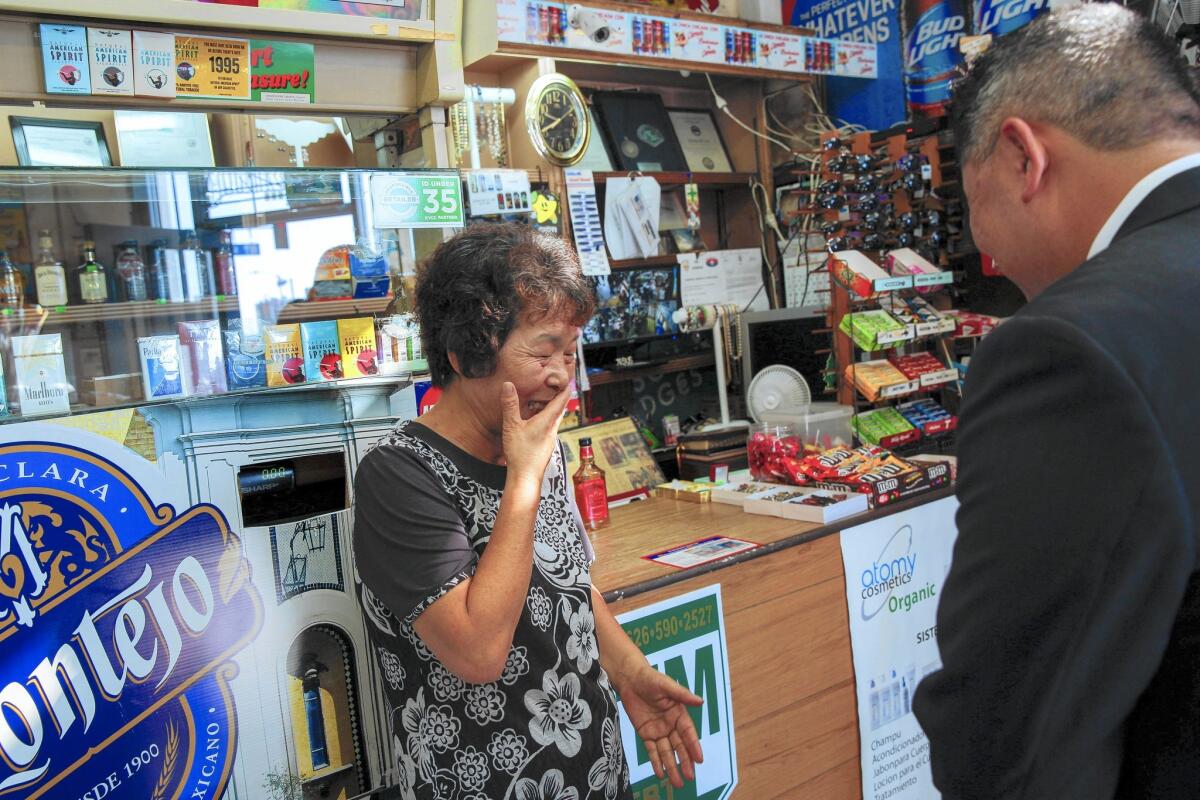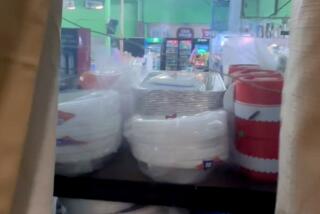This Koreatown liquor store stands out for fighting underage drinking

Even before they were targeted for arson and looting in the 1992 Los Angeles riots, liquor stores, particularly Korean-owned ones, had a painful resonance in the city of Los Angeles. Their owners, who often lived elsewhere, had a reputation for being eager to make a buck at the expense of the community’s well-being.
To many Koreatown residents, OK Liquor has long been an exception.
This month, a community group honored the store for setting an example in helping prevent alcohol sales to minors and slowly changing perceptions in an industry that usually gets attention only for the social ills it engenders.
See the most-read stories this hour >>
In Koreatown and nearby areas in recent years, a community group has been working to enlist liquor stores in helping to solve neighborhood problems, in particular those caused by underage drinking.
On Wednesday, the Koreatown Youth and Community Center, the office of Sen. Kevin de León and the Los Angeles Police Department honored OK Liquor for being part of the group’s Responsible Retailer Campaign, which is aimed at helping liquor store owners in Koreatown and surrounding areas understand and comply with state laws against underage drinking.
The barely seven-square-mile area of Koreatown, Westlake and Pico Union is dotted with 245 liquor stores, many within a stone’s throw from a school, according to the community group. By contrast, South Los Angeles, which is twice as large, has 152 liquor stores.
“You can just drive down the street and see liquor store after liquor store,” LAPD Capt. Vito Palazzolo said at last week’s ceremony.
The state Department of Alcoholic Beverage Control, or ABC, cites stores when they get caught selling to minors in undercover sting operations, resulting in fines and suspensions. Liquor licenses are revoked when a store racks up three violations within three years — but some owners simply transfer the license to a relative and keep operating, Palazzolo said.
Statewide, sting operations using minors to see if retailers will sell them alcohol resulted in 1,327 citations in the fiscal year ending June 2014, according to the ABC.
In Koreatown and nearby, 40% of the youth surveyed by the group in 2012 said that they had consumed alcohol in the last 30 days, and the majority said it would be “very easy” to get liquor in the area. Nationwide, 23% of underage youth said they had consumed alcohol in the last month, according to the 2013 National Survey on Drug Use and Health.
Three liquor stores just down 8th Street from OK Liquor have been cited for selling to minors, according to the California Department of Alcoholic Beverage Control’s database. 77 Liquor Market, across the street from the Robert F. Kennedy Community Schools campus, has had three citations; Catalina Liquor and now-closed Assi Supermarket had each been cited twice.
Palazzolo said irresponsible liquor stores create a host of problems for the surrounding community — public intoxication, public urination or defecation, and drunks passed out on the streets, in addition to underage drinking.
Youth alcohol consumption breeds myriad consequences that affect the surrounding area. One in five drivers ages 16 to 19 involved in fatal crashes in 2010 had alcohol in their system, according to the Centers for Disease Control and Prevention. Other studies have tied teen drinking to sexual assault and illegal drug use.
The Koreatown group explains state law to liquor store owners, the majority of whom are immigrants. It discusses such requirements as checking identification and keeping 70% of a window’s surface clear so that owners can spot loitering drunks or see if teens are asking adults to purchase alcohol for them, a practice known as “shoulder tapping.”
Representatives of the group, which include Korean, Spanish, Bengali and Hindi speakers, regularly check in with about 90 stores in the area that were chosen because of their proximity to schools, past citations, or input from the community that they were problem stores, said Paula Escobar, a member of the outreach team.
NEWSLETTER: Get the day’s top headlines from Times Editor Davan Maharaj >>
When the program started in 2013, many were wary, with some store owners even telling the group to never come back. But with persistent outreach, owners warmed to the assistance the group offered in navigating the laws and avoid citations that could shut them down.
Palazzolo noted that OK Liquor hadn’t had a single citation since the LAPD’s Olympic division opened in 2009, and thanked owner Bong Ok Lee for setting an example for other liquor stores in the area.
OK Liquor was run for three decades by Young Ok Lee, who lived nearby in Koreatown. With no children of her own, she loved the neighborhood children as if they were her own, always giving out candy and pasting photos of them all over the store, her sister, Bong Ok Lee, recalled. Over the years, regulars came to call her “Mama.”
After her sister died of cancer last year, Bong Ok Lee took over, and soon discovered that teenagers were constantly trying to buy alcohol. Each time, she was reminded of her sister.
Not long after her sister’s death, a young man came by and said that when he was growing up in the neighborhood, Lee’s sister had doted on him each time he came into the store. Then one day, while still underage, he tried to buy a pack of cigarettes.
Young Ok Lee not only refused to sell to him, but angrily berated him, telling him to never come back, he recalled.
In hindsight, the young man said, he came to understand how much she cared about her community.
ALSO
Will USC employees drive more without a subsidy for transit passes?
Paper plates and plastic forks? Drought restriction rankles restaurants and diners
Gov. Jerry Brown targets his next priorities as he decides on final slate of bills
More to Read
Sign up for Essential California
The most important California stories and recommendations in your inbox every morning.
You may occasionally receive promotional content from the Los Angeles Times.











